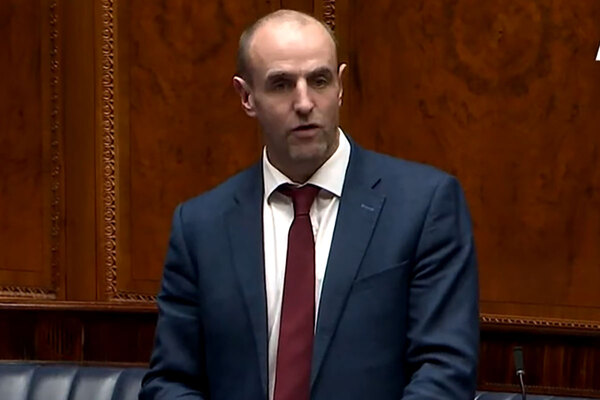Dispatches from County Down
After a busy two-day conference in Northern Ireland, Nathaniel Barker runs through the key themes which have dominated discussions
This week, the Northern Ireland Federation of Housing Associations (NIFHA) annual conference returned once again to the splendour of the Slieve Donard Hotel in Newcastle, County Down.
Set between dramatic hills and a restless Irish Sea, it was a setting which afforded the two-day event a distinct sense of gravity.
There was much to discuss, some of it highly pressing. Below, Inside Housing rounds up a few of the key themes and topics on the speakers’ and delegates’ lips.
Political deadlock
Northern Ireland is heading towards its ninth consecutive month without a government. The implications of this stark fact for the social housing sector were brought into focus as Ian Snowden, director of housing, policy and performance at the Department for Communities, opened the conference. This is generally a slot reserved for ministers, not civil servants.
Mr Snowden was keen to demonstrate that his department has been working hard for the sector, promising that a draft bill on reversing reclassification would be ready for when ministers eventually return to Stormont, and he announced a new consultation on allocations reform.
Yet he was also managing expectations here. He laid out the limits on the department’s powers at the present time – including its ability to take steps to mitigate the Local Housing Allowance cap – without legislative guidance from the Northern Ireland Assembly.
Ian Snowden, Director of Housing @CommunitiesNI sets out limitations of civil service’s powers during current impasse at #NIFHA17 pic.twitter.com/4l9LstsV67
— Cameron Watt (@AlphaCRW)Ian Snowden, Director of Housing @CommunitiesNI sets out limitations of civil service's powers during current impasse at #NIFHA17 pic.twitter.com/4l9LstsV67
— Cameron Watt (@AlphaCRW) September 28, 2017
Universal Credit
The day before the conference, Universal Credit crossed the Irish Sea for the first time, as the new welfare system was rolled out in Limavady in County Derry/Londonderry.
Concerns about its impact were rife. There were suggestions that experiences in pilot areas across the rest of the UK – particularly of spiralling levels of rent arrears among claimants – could be even more acute in Northern Ireland. For example, limited internet access across the region and bizarre technical issues – such as the Department for Work and Pensions’ Verify online system not recognising Northern Irish driving licences as identification – could give landlords serious headaches.
Mitigation measures put in place by the Executive before it collapsed do provide some solace, however, and it will be interesting to see how the region-wide roll-out unfolds over the next two years.
Universal concern about roll out of Universal Credit @NIFHA Annual Conference @Slievedonard #NIFHA17 pic.twitter.com/3OqBSOm86e
— Nichola Mallon (@NicholaMallon)Universal concern about roll out of Universal Credit @NIFHA Annual Conference @Slievedonard #NIFHA17 pic.twitter.com/3OqBSOm86e
— Nichola Mallon (@NicholaMallon) September 28, 2017
Supporting People
Another issue which received a significant airing was the Supporting People budget. This fund, distributed by the Northern Ireland Housing Executive (NIHE) to help pay for homelessness prevention and supported housing services, has received a 5% cut. After fervent lobbying from the sector, the NIHE has promised to restore the funding – though questions abound over when this materialise, and how it will be allocated.
Pushing on
Housing associations in Northern Ireland are standing up to unprecedented levels of uncertainty, then – particularly when you consider that Brexit is likely to have its biggest impact on the region, as the only part of the UK bordering an EU country.
On this topic, Carol McTaggart, development director at Clanmil, was succinct when she said: “It’s too early to say what the impact of Brexit will be, but it would be foolish to assume that there will be none.”
Yet with these challenges come unique opportunities for the sector to prove its resilience and inventiveness.
There are 22,000 households in Northern Ireland identified as being in housing stress. “We owe it to them to try to overcome these challenges,” said Ms McTaggart.
Carol McTaggart of @ClanmilHousing provides a positive slant on the development challenges faced. #nifha17 pic.twitter.com/Ox6oz49eGn
— Ark Housing (@arkhousing)Carol McTaggart of @ClanmilHousing provides a positive slant on the development challenges faced. #nifha17 pic.twitter.com/Ox6oz49eGn
— Ark Housing (@arkhousing) September 28, 2017
Day one summary. These are challenging & uncertain times for HAs in NI but sector remains resilient & optimistic about the future #nifha17 pic.twitter.com/5npVRJO50a
— Peter Shanks (@PeterShanks82)Day one summary. These are challenging & uncertain times for HAs in NI but sector remains resilient & optimistic about the future #nifha17 pic.twitter.com/5npVRJO50a
— Peter Shanks (@PeterShanks82) September 28, 2017







